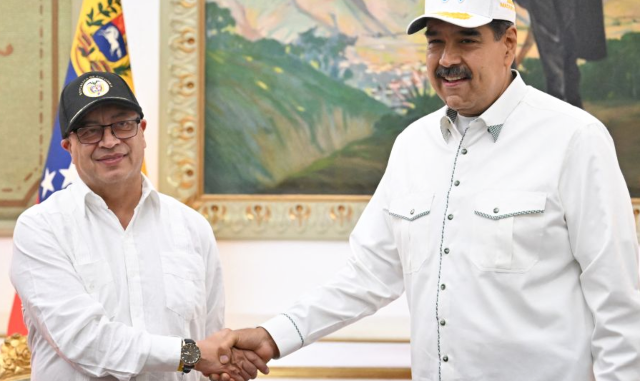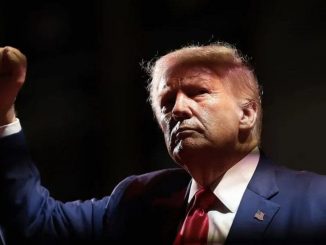
| Published August 11, 2025
Far-left President of Colombia Gustavo Petro pledged his support for Venezuelan socialist dictator Nicolás Maduro on Sunday after the United States doubled its bounty on Maduro to $50 million.
Colombian President Gustavo Petro has ordered the nation’s military to defend Venezuelan President Nicolás Maduro following the U.S. government’s decision to double its reward for information leading to Maduro’s arrest to $50 million. Petro emphasized that Colombia and Venezuela share a common heritage and any military action against Venezuela without mutual consent would be considered an act of aggression against Latin America and the Caribbean.
The U.S. Department of Justice, led by Attorney General Pam Bondi, announced the increased bounty, accusing Maduro of leading the Cartel of the Suns, a transnational drug trafficking network involving high-ranking Venezuelan officials. The U.S. government has previously designated the Cartel of the Suns as a Specially Designated Global Terrorist entity.
In response, Petro shared a video from the Venezuelan regime reaffirming the military’s loyalty to Maduro and rejecting the U.S. accusations. He accompanied the video with a message invoking the legacy of Simón Bolívar, emphasizing the shared history and values of Colombia and Venezuela .
This development highlights the ongoing tensions between the U.S. and Venezuela, with Colombia’s stance adding another layer to the complex geopolitical dynamics in the region.
 Implications
Implications
Here are the key implications of Colombian President Gustavo Petro ordering the military to defend Venezuelan President Nicolás Maduro after the U.S. increased its bounty on Maduro:
Geopolitical Implications
-
Regional Tensions Rise: Colombia’s explicit support for Maduro directly challenges U.S. efforts to pressure the Venezuelan regime. This risks escalating tensions between Colombia, the U.S., and Venezuela.
-
Strained U.S.-Colombia Relations: Colombia has historically been a U.S. ally, especially on security and anti-narcotics efforts. Petro’s stance could strain this relationship, potentially impacting aid, cooperation, and diplomatic ties.
-
Solidarity in Latin America: Petro invoking Simón Bolívar and shared heritage signals a push for Latin American unity against external interference, particularly from the U.S., fostering a more assertive regional bloc.
Security Implications
-
Risk of Military Confrontation: Petro warns any U.S. military action against Venezuela without consent would be seen as aggression toward Latin America and the Caribbean. This raises the stakes of possible military conflicts or proxy clashes in the region.
-
Support for Maduro’s Regime: Colombia’s military backing bolsters Maduro’s position amid U.S. sanctions and international pressure, potentially prolonging the Venezuelan crisis and weakening opposition efforts.
Political Implications
-
Polarization in Colombia: Petro’s leftist government’s stance may deepen political divisions within Colombia, where many oppose Maduro’s government and favor closer ties to the U.S.
-
Impact on Latin American Politics: Other left-leaning governments in the region might follow Colombia’s lead, complicating international efforts to isolate Venezuela diplomatically.
Economic Implications
-
Potential Sanctions Impact: Colombia may face economic repercussions from the U.S., including possible sanctions or restrictions on aid, trade, or financial dealings.
-
Drug Trafficking and Security: With Maduro accused of leading the Cartel of the Suns, Colombia’s defense of Maduro could complicate anti-narcotics operations in a region heavily affected by drug trafficking.
 Overall Takeaway:
Overall Takeaway:
Colombian President Gustavo Petro’s decision to order the military to defend Venezuelan President Nicolás Maduro marks a significant shift in regional dynamics, directly challenging U.S. policy and escalating geopolitical tensions in Latin America. By emphasizing shared history and rejecting U.S. accusations, Petro signals a move toward greater regional solidarity against external intervention. This stance risks straining Colombia’s traditional ties with the U.S., potentially complicating efforts to address issues like drug trafficking and political instability. Ultimately, this development underscores the deepening divide over how to handle Venezuela’s crisis and could reshape alliances and power balances throughout the region.





Be the first to comment